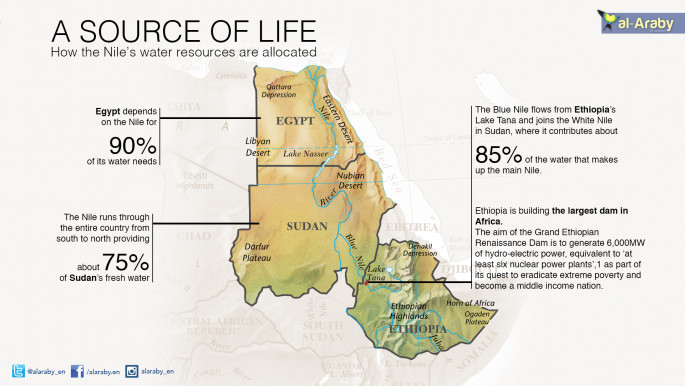Egypt blames European consultancy firms for Nile dam delays
So far, Egypt, Sudan and Ethiopia have not reached an agreement about the distribution of the Nile's waters after the dam is completed.
Egypt's foreign ministry spokesperson Ahmed Abu Zeid said on Thursday that water quotas have not yet been reached due to the failures of French and Dutch firm involved the project.
"The last tripartite meeting was crucial as the two firms stumbled in reaching an agreement," MENA website reported Abu Zeid saying.
Egypt hopes that the three Nile Basin countries affected by the scheme will reach an agreement later this month.
The next round of talks will take place in the Sudanese capital Khartoum on 27 and 28 December.
"The anxiety that Egyptians feel towards this issue is legitimate, but we should not take this to another level," the spokesperson added. "Officials will not give up on Egypt's water security."
Egypt is downstream country and is heavily reliant on the river's waters for farming, industry and home use.
It fears that it will lose out on access to water and President Abdel Fattah al-Sisi has claimed that he is battling with Ethiopia to get the best possible deal for Egypt.
Abu Zeid said that Ethiopia - which lies upstream and site of the dam - is keen to consider the impact on downstream countries with the dam, and believes a deal can be reached which will be of benefit to all three countries.
Egyptian media reports had said that an agreement was not reached between the three countries earlier this month.
Sudanese Foreign Minister Ibrahim Ghandour was careful to correct the claims and said that the tripartite meeting had achieved "positive results".
 |
|
| How the Nile's water resources are allocated [al-Araby al-Jadeed] |
"Among the concerns that were raised were the fast pace of building the dam, the importance of the impact dam studies, and also the importance of not filling the dam at any stage," Egypt's Irrigation Minister Hossam Moghazi told Egypt's TEN TV channel last week.
Ghandour also rejected the media reports, saying that officials from the three countries had agreed not to talk to the media about what was agreed in the last meeting.
He said statements by officials in the media are sometimes "taken out of context".
The Sudanese FM stressed that Sudan was not taking sides between Egypt and Ethiopia and said that the three were working on mechanisms to implement a March declaration.
"I cannot tell whether I am optimistic or pessimistic," he said. "I believe that we can reach an agreement in the upcoming round of talks."
Sudanese minister of water resources and electricity Moataz Moussa was also keen to reassure Egypt that Khartoum would not use up the Nile's water and leave Cairo dry.
The issue of the dam has sparked nationalist sentiments in Egypt, which has long-standing tentions with the other two countries and led to rising tensions.
"We are keen on showing restraint," the minister said in a statement at the time. "We will not resort to using water resources as a weapon.
"Ethiopia's Renaissance Dam will ensure the country fully benefits from its share of the Nile water," he added.
Despite this, the construction of the dam is said to be at least 40 percent complete and when finished it will be Africa's largest hydroelectric power plant, with a storage capacity of 74 billion cubic metres of water.
![Egypt Sudan Ethiopia agreement Renaissance Dam [AFP] Egypt Sudan Ethiopia agreement Renaissance Dam [AFP]](/sites/default/files/styles/image_345x195/public/media/images/2D7156C6-89C5-4CFE-B0FF-5A35684FA2FD.jpg?h=d1cb525d&itok=AXH6HOLA)




 Follow the Middle East's top stories in English at The New Arab on Google News
Follow the Middle East's top stories in English at The New Arab on Google News


